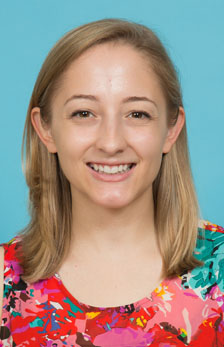Rehabilitation and Participation Science
Program in Occupational Therapy
 Katherine Heidorn, MSOT/S ‘16
Katherine Heidorn, MSOT/S ‘16
Clinical/Community Track: LifeBridge Partnership
Why did you choose WUOT for your occupational therapy education?
WUOT offers a wide range of research opportunities from statistical to clinical to community. Participating in research allows students valuable hands-on experience in a specific area of OT. The variety of labs also speaks to the diversity of the faculty; each focuses in a specific area of OT. Besides WUOT’s academic reputation as one of the top schools for occupational therapy in the country, I was drawn to the number of faculty who have been and continue to be innovative forces in occupational therapy practice and research. I was also drawn to WUOT’s focus on the role of OT in community practice.
Why did you choose a clinical/community track experience for your degree?
I wanted the opportunity to work with people in the community and assist in facilitating occupational engagement in the community.
Briefly describe your agency.
My agency, LifeBridge Partnership, is a local community recreation agency which serves individuals with cognitive and physical disabilities across the lifespan. LifeBridge is split into two programs – youth and adult. Youth participants transition into the adult program upon completion of high school. The challenge that LifeBridge faces is maintaining membership during that transition.
Describe your involvement with the agency (programs/services).
As the partner, my role was to create a needs assessment and, from that, develop a sustainable program to facilitate participant transition and engagement in leisure in adulthood. In creating the needs assessment I had the opportunity to interact with many members of the LifeBridge community, including staff, parents and participants. I also delved into the literature and spoke with outside sources to create a well-rounded needs assessment. From this data collection, I saw the important connection between transportation and leisure engagement, particularly for these young adults. I began to see LifeBridge’s role in filling the gap in transition services and low levels of engagement in leisure through a public bus transportation training module. I developed a pilot transportation training program for LifeBridge.
How do you think this work has enhanced your clinical skills?
Through this lab experience, I now see the need for well-rounded assessment to create a client-centered intervention that fully serves the client’s needs. This is something I will hold with me as I delve into clinical practice
How did you feel about the guidance provided by your faculty mentor?
Dr. Christine Berg is a superb mentor. She allows her mentees to take full ownership of their project and work independently, and offers assistance when needed. She treats her mentees as her professional peers.
How would you describe this experience to prospective students who may be interested in community practice?
Working in the community is a great experience. It allows a student to work alongside community members to facilitate participation within the community. Developing a sustainable program that fits the needs of the community and seeing it put in place is highly rewarding. In this community track, the intervention or program serves a population instead of one client – an amazing outcome.
How will these experiences affect or influence your career direction after graduation?
After I leave Washington University, I would like to continue my focus on transportation. My goal is to find other OTs and agencies in the area who work with young adults with disabilities in the community. A transportation program is one intervention strategy that facilitates independence for engagement in leisure, work and school – all vital areas of occupation for community engagement.
We welcome inquiries from prospective students, potential collaborators, community partners, alumni and others who want to connect with us. Please complete the form below to begin the conversation.
Schedule an Info Session
We are excited that you are considering applying to the Program in Occupational Therapy at Washington University. Please join us for a Zoom Information Session for either our entry-level MSOT or OTD degrees or our online Post-Professional OTD. Current faculty members will discuss the degree program and answer any question you may have. We are offering these sessions on the following days and times. The content is the same for each one, so you only need to sign up for one.
Upcoming ENTRY-LEVEL Degree ZOOM Info sessions:
Schedule an Entry-Level Info Session
Upcoming PP-OTD Degree ZOOM Info session: